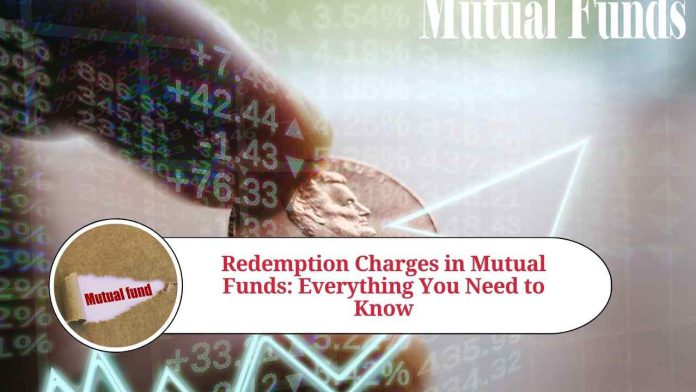Investing in mutual funds is an excellent way to grow your wealth over the long-term. However, when you decide to redeem your mutual fund units, you may have to pay redemption charges, also known as exit load fees. Redemption charges are fees that investors are required to pay when they sell their mutual fund units before a specific period.
In this blog post, we will explore everything you need to know about redemption charges in mutual funds, including what they are, how they work, and how they can impact your investment returns.
What Are Redemption Charges in Mutual Funds?
Redemption charges are fees charged by mutual fund houses to investors when they redeem their mutual fund units. These fees are levied to discourage investors from withdrawing their investments too soon and to cover the costs associated with managing the mutual fund.
Redemption charges are usually a percentage of the value of the mutual fund units being redeemed, and the amount charged varies from one mutual fund scheme to another. The charges are typically higher for shorter holding periods and decrease over time.
How Do Redemption Charges Work?
Redemption charges are typically structured in two ways – either a flat fee or a percentage of the redemption amount. For example, a mutual fund scheme may charge a 1% redemption fee if you redeem your units within one year of investing. Alternatively, the scheme may have a tiered structure where the redemption fee decreases over time, for example, 2% if redeemed within six months, 1.5% if redeemed within nine months, and 1% if redeemed within one year.
It is essential to note that not all mutual fund schemes charge redemption fees. However, many schemes do levy such charges, especially those that invest in illiquid assets or have high portfolio turnover ratios.
How Can Redemption Charges Impact Your Investment Returns?
Redemption charges can impact your investment returns, especially if you redeem your mutual fund units before the minimum holding period. When you redeem your units, the redemption charges are deducted from the redemption amount. This reduces the amount you receive and, therefore, reduces your investment returns.
Let’s take an example to illustrate this. Suppose you invest Rs. 1 lakh in a mutual fund scheme that charges a 2% redemption fee if redeemed within six months. If you redeem your units after three months, you will have to pay a redemption fee of Rs. 2,000 (2% of Rs. 1 lakh). This means that you will receive only Rs. 98,000 (Rs. 1 lakh – Rs. 2,000) when you redeem your units. In this case, the redemption charges reduce your investment returns by 2%.
Conclusion
Redemption charges are an essential aspect of investing in mutual funds. They are designed to discourage investors from withdrawing their investments too soon and to cover the costs associated with managing the mutual fund. As an investor, it is essential to understand the redemption charges applicable to your mutual fund scheme and the impact they can have on your investment returns. By doing so, you can make informed investment decisions and maximize your returns over the long-term.
Read more useful content:
- How to invest in mutual funds
- All about mutual funds-types & importance
- The Power of SIP Investment in Mutual Funds
Frequently Asked Questions (FAQs)
Q. What are redemption charges in mutual funds?
Redemption charges are fees charged by mutual fund houses to investors when they redeem their mutual fund units before a specific period. These charges are levied to discourage investors from withdrawing their investments too soon and to cover the costs associated with managing the mutual fund.
Q. How are redemption charges calculated?
Redemption charges are typically calculated as a percentage of the value of the mutual fund units being redeemed. The amount charged varies from one mutual fund scheme to another and is usually higher for shorter holding periods.
Q. Do all mutual fund schemes charge redemption fees?
No, not all mutual fund schemes charge redemption fees. However, many schemes do levy such charges, especially those that invest in illiquid assets or have high portfolio turnover ratios.
Q. Can I avoid redemption charges in mutual funds?
Yes, you can avoid redemption charges in mutual funds by holding your units for the minimum required period. Most mutual fund schemes have a minimum holding period, and if you redeem your units after that period, you will not be charged any redemption fees.
Q. How do redemption charges impact my investment returns?
Redemption charges can impact your investment returns, especially if you redeem your mutual fund units before the minimum holding period. When you redeem your units, the redemption charges are deducted from the redemption amount. This reduces the amount you receive and, therefore, reduces your investment returns.
Q. Can I negotiate redemption charges with mutual fund houses?
No, redemption charges are pre-determined and are not negotiable. The charges are usually disclosed in the offer document or the scheme information document.
Q. Are redemption charges tax-deductible?
No, redemption charges are not tax-deductible. These charges are considered a part of the cost of investment and are not treated as a tax-deductible expense.
Q. Can I switch from one mutual fund scheme to another without paying redemption charges?
No, switching from one mutual fund scheme to another usually involves redeeming your units in the current scheme and investing in the new scheme. Therefore, redemption charges may apply, depending on the holding period of your units in the current scheme.
Q. Do redemption charges vary for different types of mutual fund schemes?
Yes, redemption charges vary for different types of mutual fund schemes. For example, equity mutual fund schemes may have different redemption charges than debt mutual fund schemes. It is essential to check the redemption charges applicable to your specific mutual fund scheme before investing.
Q. Are redemption charges the same for all investors?
Yes, redemption charges are the same for all investors in a mutual fund scheme, regardless of the size of their investment.




















